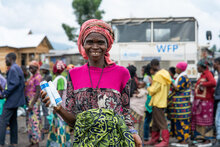Major Donation From Japan Helps Feed Millions Of Hungry People In 26 Countries
“This is yet further proof of Japan’s continued commitment to saving lives and strengthening human security in many of the world’s hunger hot spots where the poorest and most vulnerable people are at greatest risk,” said Stephen Anderson, Director of WFP Japan Office. “WFP deeply appreciates this generous and timely aid package that allows WFP to support the emergency food needs of millions of people today, while laying a solid nutritional foundation to build a better tomorrow.”
A large part of the donation will support conflict-affected people in the Middle East, especially in Syria, as well as refugees in neighbouring countries, and Yemen where the funds will help promote regional peace and stability.
WFP faces its most challenging, complex and largest emergency in Syria and surrounding countries; Japan’s aid will be used to distribute food and vouchers to more than seven million Syrians. In Yemen, funds will go towards providing emergency food assistance to some six million people including those displaced by insecurity, host communities, returnees and school girls.
The channelling of funds to Afghanistan, long affected by conflict, is in line with Japan’s aid policy of promoting sustainable and self-reliant development. Funds will go towards meeting the nutritional needs of the most vulnerable people including those suffering from natural disasters, malnourished children, pregnant and breastfeeding women.
In Africa, Japan’s contribution will assist millions hit by insecurity and natural disasters in 18 countries including in Central African Republic and South Sudan where fighting has led to large-scale humanitarian emergencies that have become a major concern for WFP and the international community. This contribution is a mark of Japan’s bold leadership on African development, as demonstrated through hosting the Fifth Tokyo International Conference for African Development (TICAD V) in June last year.
WFP’s logistics operation will also benefit from Japan’s support in Sudan, South Sudan, Democratic Republic of Congo and Afghanistan, where the agency is also responsible for the United Nations Humanitarian Air Service providing critical air transport and cargo services for the humanitarian community.
The breakdown of the contribution is as follows:
Syria Crisis: Syria (US$4.5 million), Lebanon (US$3 million), Jordan (US$2.8 million), Iraq (US$2 million), Turkey (US$1.9 million), Egypt (US$0.7 million),
Yemen (US$10 million)
Afghanistan (US$10.8 million)
Africa: Mali (US$6.5 million), Sudan (US$6 million), South Sudan (US$4.6 million), Ethiopia (US$4.2 million), Kenya (US$4.2 million), Somalia (US$4.2 million), Niger (US$3.9 million), Democratic Republic of Congo (US$3.4 million), Uganda (US$2.8 million), Mauritania (US$2.4 million), Malawi (US$2.1 million), Central African Republic (US$1.7 million), Guinea (US$1.6 million), Tanzania (US$1.4 million), Rwanda (US$1.1 million), Cameroon (US$0.9 million), Madagascar (US$0.9 million), and Liberia (US$0.7 million).
# # #
WFP is the world’s largest humanitarian agency fighting hunger worldwide. On average, WFP reaches more than 90 million people with food assistance in 80 countries each year.
Follow us on Twitter @wfp_media
For more information please contact (email address: firstname.lastname@wfp.org):
Yuko Yasuda, WFP/Tokyo, Tel. +81 03 5766 5364, Mob. +81 90 9844 9990

